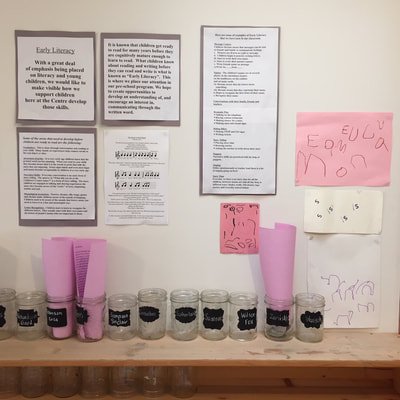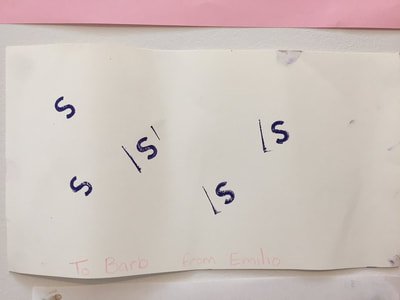Early Literacy
With a great deal of emphasis being placed on literacy and young children, we would like to make visible how we support children here at the Centre develop those skills.
It is known that children get ready to read for many years before they are cognitively mature enough to learn to read. What children know about reading and writing before they can read and write is what is known as “Early Literacy”. This is where we place our attention in our pre-school program. We hope to create opportunities to develop an understanding of, and encourage an interest in, communicating through the written word.
The Rock 'n Roll Band
February 2016
The three boys prompted by Finn formed a Rock 'n Roll band.
Finn had a wooden plank
Emilio a frying pan and spoon
Maddox had a computer keyboard.
“Then they went home.” said Finn abruptly and the others followed him to the house keeping corner. Then back to the band area........
“ 1,2,3,4, YOW! YOW!
Finn spontaneously cried, “We late for the band! Rock 'n Roll camel.”
Maddox picked up a computer keyboard and said, “This piano is an electric piano.”
“I've got a electric guitar.” said Finn
Emilio joined in and said, “This is an electric drum. This is my drum stick.
Finn offered Jason a ride. Jason refused by saying, “No, I don't because I hate music.”
Finn was not deterred, “Come to my band, you'll really like it. Hey, you've got star shoes, you like music.”
“No I don't, I hate music.”
Jason became the guy who stayed at home where he offered the band members food after their gig.
A video was taken and unfortunately lost. It was a joy to hear them whooping and creating the sounds of their band with their voices.
Some of the areas that need to develop before children are ready to read are the following:
Vocabulary: This is done through conversation and reading to your child. Many hands on experiences help connect words to the real object or idea.
Awareness of print: At a very early age children learn that the printed word carries meaning. When you read to your child they become aware that it is the words in print that tells the story they are enjoying. Street signs labels and even store logos and names become recognizable to children at a very early age.
Narrative Skills: Everyday conversation is an early form of story telling. The answer to “What did you do at the Children’s Centre today?” is a form of story telling. The more children are engaged in talking and sharing experiences the more they become aware of the “order” of story, beginning, middle and end.
Phonological awareness: Nursery rhymes, silly songs, games and rhymes make children aware of the sounds of language. Children need to be aware of the sounds that letters make, but need to learn it in a fun and meaningful way.
Letter Recognition: Children start to learn to recognize the different letters. They usually start with their own name and the letters of people’s names who are important to them.
Here are some of examples of Early Literacy that we have seen in our classroom.
Message Centre:
When I use the message Centre I am learning how to:
become aware that messages can be sent to friends and family to communicate feelings.
draw pictures to convey messages.
write letters.
write my own name.
write my parent’s name
write friend’s name on message
write To……, from…….
Names - The children’s names are in several places: in the attendance basket; on the mailboxes; on the cubbies and on name cards. When I see my friends names in these places, I am learning:
that the letters mean something.
that letters represent their name.
to recognize the first letter of their name.
recognize their name and my friend’s name
Sequencing -
When I am sequencing, I am learning:
there is a beginning, middle and an end
we read from left to right
how to predict what comes next
Puppets -
When I play with puppets, I am learning to:
tell a story (narrative skills)
be aware of the “order” of story
role play characters
Felt Board -
When I play with the felt board I am learning to:
master a story
re-enact and become confident in storytelling
build a loving relationship with stories
make up my own stories
Singing -
When I sing I am learning how to:
appreciate music
rhyme
develop auditory memory for sounds
Dramatic Play -
When I play in the house keeping corner, I am learning to:
make up stories with the telephone
make up stories with friends over a cup of tea
be aware of the “order” of story telling through my game which has a beginning, a middle and an end.
make signs which send messages to the group
e.g the restaurant is “Open” or “Closed”
Scribing Stories -
When you scribe my stories and read them back to them, I am learning to:
link my storytelling to written words and will see that you value what I am doing.
Story Time -
Everyday we have a set story time for all the children, however stories are told all day long in different ways:
books; orally; felt stories; tape stories; and everyday conversations




